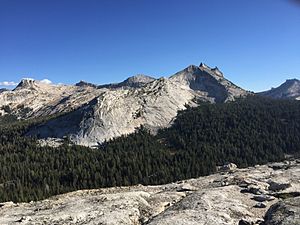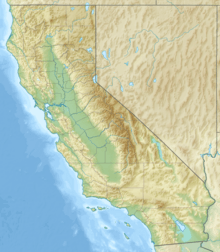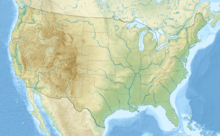Cathedral Range facts for kids
Quick facts for kids Cathedral Range |
|
|---|---|

Cathedral Range from the summit of Fairview Dome. From L-R: Unicorn Peak, Cockscomb, Echo Ridge and Cathedral Peak.
|
|
| Highest point | |
| Peak | Mount Florence |
| Elevation | 12,561 ft (3,829 m) |
| Dimensions | |
| Length | 10 mi (16 km) |
| Geography | |
| Country | United States |
| State | California |
| County | Madera County |
| Range coordinates | 37°44′22″N 119°16′19″W / 37.7393751°N 119.2718135°W |
| Parent range | Sierra Nevada (U.S.) |
| Topo map | USGS Mount Lyell |
The Cathedral Range is a group of mountains found in Yosemite National Park in California, USA. It sits just south of an area called Tuolumne Meadows. This range is like a branch coming off the much larger Sierra Nevada mountain range. It gets its name from Cathedral Peak, which looks a lot like the tall, pointed roof of a cathedral building.
Exploring the Cathedral Range
The Cathedral Range is home to several famous peaks. These include Cathedral Peak itself, along with Unicorn Peak, Eichorn Pinnacle, Echo Peaks, Echo Ridge, Matthes Crest, and Cockscomb. Each of these peaks has its own unique shape and challenge for climbers.
The tallest point in this range is Mount Florence. It stands out as one of the highest and most noticeable peaks in the high country of Yosemite. While Mount Florence is the highest in the range, the highest peak directly in Tuolumne Meadows is Johnson Peak.
Lakes and Trails
Right next to the mountain range are the two beautiful Cathedral Lakes. They are located about one mile southwest of Cathedral Peak. If you love hiking, you can reach these lakes and the Cathedral Range by following the famous John Muir Trail. This trail starts from a special spot in Tuolumne Meadows.
How the Mountains Were Formed
The amazing shapes of the Cathedral Range mountains were created by glaciers. Long, long ago, huge sheets of ice moved slowly across the land. As they moved, these glaciers carved out the soft granite rock. This process helped shape the valleys and steep sides of the mountains.
The very tops of the peaks in the Cathedral Range were so tall that the glaciers couldn't reach them. Because of this, these highest points were not worn down by the ice. This is why they look so sharp and pointed, like spires. These untouched peaks are sometimes called nunataks. You can learn more about the type of rock here by looking up Cathedral Peak Granodiorite.
See also
 In Spanish: Cordillera Catedral para niños
In Spanish: Cordillera Catedral para niños
 | James B. Knighten |
 | Azellia White |
 | Willa Brown |



